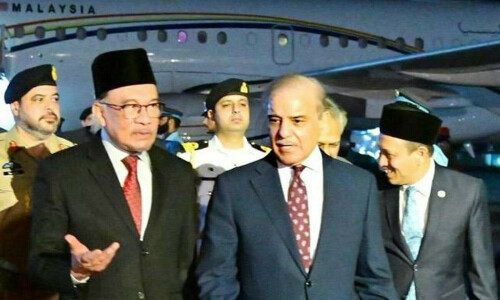• Outgoing chief says army received flak for ‘involvement in politics’ over past seven decades
• Calls out political parties for petty rivalries, asks them to put aside ego for country
• Says ready to forgive PTI for crafting ‘fake’ narrative against military
• Terms East Pakistan crisis a ‘political failure’
ISLAMABAD: Outgoing army chief General Qamar Javed Bajwa on Wednesday admitted that the army for seven decades had “unconstitutionally interfered in politics”, and at the same time criticised political parties for erring and being intolerant towards rivals.
The rare candid admission by an army chief came at what could possibly be Gen Bajwa’s last public appearance before the change of command ceremony next week.
He was speaking at the Defence and Martyrs Ceremony at the General Headquarters. The annual event, which is held on Sept 6, could not be held this year because of floods and was organised now as part of Gen Bajwa’s farewell engagements.
Gen Bajwa reserved most of his criticism for Pakistan Tehreek-i-Insaf (PTI) and accused the former ruling party of crafting “a fake and false” narrative against the army and calling the senior commanders names. The army chief, however, added that he was ready to forgive and leave the controversy behind.
Gen Bajwa said that the army often faced criticism at home because of its “interference in politics” in various ways for seventy years, which is “unconstitutional”.
It may be recalled that army’s interference in politics has been widespread and has ranged from dislodging civilian governments through coups to indirectly controlling weak dispensations. Political leaders have, meanwhile, quite readily ceded space to the military due to their weaknesses allowing the institutional boundaries to be breached.
Gen Bajwa himself shared a glimpse of the extent of the military’s involvement in governance, when he listed the services of the army for the country — dealing with Financial Action Task Force, Federally Administered Tribal Areas merger, border fencing, buying gas from Qatar, and dealing with Covid-19 and locusts.
“Army always went beyond the call of duty in the service of the nation and will continue to do so,” the COAS said.
The army chief said that the interference in the political sphere by the military continued till February last year after which the military thoroughly deliberated on the matter and decided to stay out of politics. “I want to reassure you that we are strictly adhering to this decision and will continue to do so,” he maintained.
‘Ready to forgive’
The latest onslaught being faced by the army is because of the perception in the PTI that the military did not help the party’s government against the opposition’s vote of confidence. PTI Chairman Imran Khan had soon after his ouster accused “some individuals” in the powerful militant establishment of orchestrating his ouster in collusion with “foreign conspirators”.
His bitterness towards the military establishment continued to grow with the passage of time and the action against some of his aides.
Gen Bajwa said that it was naive to think that the military would not do anything if there was a foreign conspiracy against the sitting prime minister of Pakistan. “That would have been a major sin,” he added.
Emphasising that the army exercised restraint in the larger national interest despite having the resources and opportunities to respond to PTI’s criticism, he said, “I’m ready to forgive this inappropriate and aggressive attitude against me and the military and get past it because Pakistan is bigger than [all of] us.” The general added that the “army had started its catharsis” and expected the politicians to review their attitudes as well.
The army chief said the problems being witnessed by the country were because of the “mistakes committed by the institutions, political parties, and civil society”. He said it was important to learn from these errors.
He said that a major challenge was the lack of tolerance among the political parties for their rivals. He cited the example of the Pakistan Democratic Movement (PDM) calling the PTI government “selected” while it was sitting on the opposition bench, and PTI, after its ouster, calling the current administration “imported”. Gen Bajwa called for rejecting this attitude and putting aside egos for moving ahead.
He warned that the country was in a grave economic crisis and that all political parties will have to work together to pull it out of that mess. He emphasised the need for the restoration of political stability.
East Pakistan’s dismemberment
Commenting on the Dhakka debacle in 1971, the army chief said he intended to discuss the topic that people usually avoid, which related to the surrender of the troops in the former East Pakistan in 1971.
He said: “I want to correct the record. First of all, the fall of East Pakistan, was not a military but a political failure. The number of fighting soldiers was not 92,000, it was rather only 34,000, the rest were from various government departments.”
He said these 34,000 people fought 250,000 Indian army soldiers, and 200,000 trained Mukti Bahini fighters but still they fought valiantly despite all odds and offered unprecedented sacrifices.
He said the sacrifices of the soldiers who fought in East Pakistan were not recognised in the country, which was a great injustice.
Published in Dawn, November 24th, 2022















































